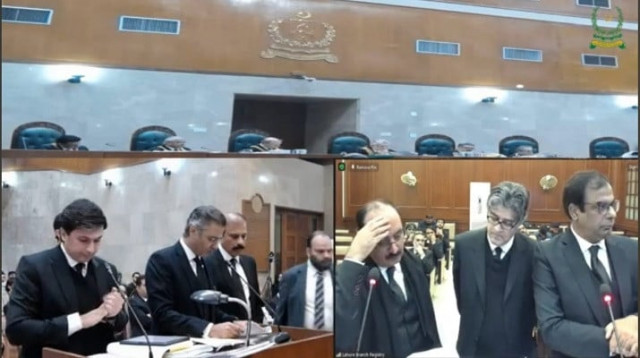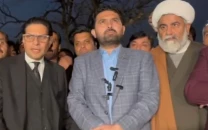SC to settle disqualification conundrum by Jan 11
Seven-judge bench wonders whether court can give its declaration without a trial

The Supreme Court said on Tuesday it would adjudicate on the contradiction between a law and a judicial ruling regarding the disqualification of lawmakers by January 11, saying that it would settle the matter once and for all.
During a hearing of the case about the disqualification under Article 62(1)f of the Constitution, the seven member bench wondered how come that crimes like murder and high treason carried a five-year disqualification, but a person was disqualified for life on presumptive moral standards.
The bench was led by Chief Justice Qazi Faez Isa, and comprised Justice Mansoor Ali Shah, Justice Yahya Afridi, Justice Aminuddin Khan, Justice Jamal Khan Mandokhel, Justice Muhammad Ali Mazhar and Justice Musrat Hilali.
The chief justice remarked that the bench aimed to swiftly conclude the proceedings to avoid any confusion for the returning officers (ROs) for the February 8 general elections. He also clarified that no impression should be taken from this case that the court was supporting a particular party.
The inconsistency between court decisions and parliamentary legislation regarding the duration of disqualification under Article 62(1)f has prompted the apex court to intervene and determine whether the disqualification of a lawmaker should be for a lifetime or for five years stipulated in the Election Act.
The disqualification conundrum stems from the addition of Article 62(1)f to the Constitution by former military ruler Gen Ziaul Haq. However, the issue gained prominence when a larger bench of the Supreme Court disqualified former prime minister Nawaz Sharif for life in the Panama Papers case.
In June last year, parliament introduced an amendment to the Section 232 of the Election Act, setting the period of disqualification to five years under the Article 62(1)(f). This legislative move adds a layer of complexity to the matter that the Supreme Court is now set to unravel.
During the hearing on Tuesday, both the attorney general for Pakistan (AGP) and senior lawyer Makhdoom Ali Khan, representing Jahangir Tareen, who was also disqualified by the Supreme Court for life, supported the five-year disqualification term.
Read SC to take up ‘lifetime disqualification’ matter today
Khan also pointed to inconsistency in two decisions of the apex court. He said that the decision in the first phase of the Panama papers case was changed in the second phase without giving reasons. He added that the judge reversed lifetime disqualification decision in the Faisal Vawda case.
As the lawyers argued, the bench members raised several questions about the period of disqualification over crimes of various natures, moral standards, and qualifications of a person to be able to contest elections in the country.
Justice Shah remarked that a person guilty of high treason, had been given the right to contest elections while a murder convict could contest elections, five years after completing his sentence, but on the civil side, he will be disqualified for life if he did not have a presumptive qualification.
Chief Justice Isa at one point remarked that a condition of graduation was included among the eligibility of the candidate, adding that had Quaid-e-Azam Muhammad Ali Jinnah been a candidate in 2002 election, he would have been disqualified.
The bench members noted that some qualification clauses related to facts and some other to morals, linked to court declarations. They asked how the good moral standards could be determined and whether the court could give its declaration without a trial.
The chief justice questioned whether giving declaration was the domain of civil court or the constitutional court. Justice Shah remarked that no declaration could be given against anyone until the evidence was recorded.
Sitting on the bench, Justice Mazhar said that if the matter related to someone’s character, then the question of that person being ‘Sadiq and Amen’ would arise. However, he posed the question, whether the declaration could be issued on the demand of the case, or by taking suo motu notice.
The chief justice pointed out that every day the testimony of a witness was rejected by calling him a liar for making a false statement. He then asked whether a person could be disqualified for life if the testimony was rejected.
The chief justice observed that in Islam, the doors of repentance were open until the last breath. He added that if someone was ignorant of Islamic teachings today, he could become a scholar five years later.
Justice Shah said that if a person was disqualified today, he would become qualified tomorrow when his disqualification period was over so how could be the lifetime disqualification on the mere declaration of the court.
Besides, the judges also raised the question whether a judicial decision on the interpretation of a provision of the Constitution could be overturned by mere amending a law or by amending the Constitution.
The chief justice told the court that since the lifelong disqualification had been removed by amending the law and no one challenged that law, the matter would not be debated further. On that, the AGP insisted that it was necessary to re-evaluate the court decisions.
The court declared that the case would be decided by January 11 and the further hearing of the case was adjourned till Thursday, January 4 (tomorrow. The chief justice said that if someone was in favour of the lifelong disqualification, he could present his argument in the court on the next date of hearing.
Later in its written order of the hearing, the court said that lawyers Faisal Siddiqui and Uzair Bhandari and Reema Umar had been appointed as amici curiae on the matter. It added that any senior lawyer could assist the court on the constitutional and legal nature of the matter.



















COMMENTS
Comments are moderated and generally will be posted if they are on-topic and not abusive.
For more information, please see our Comments FAQ